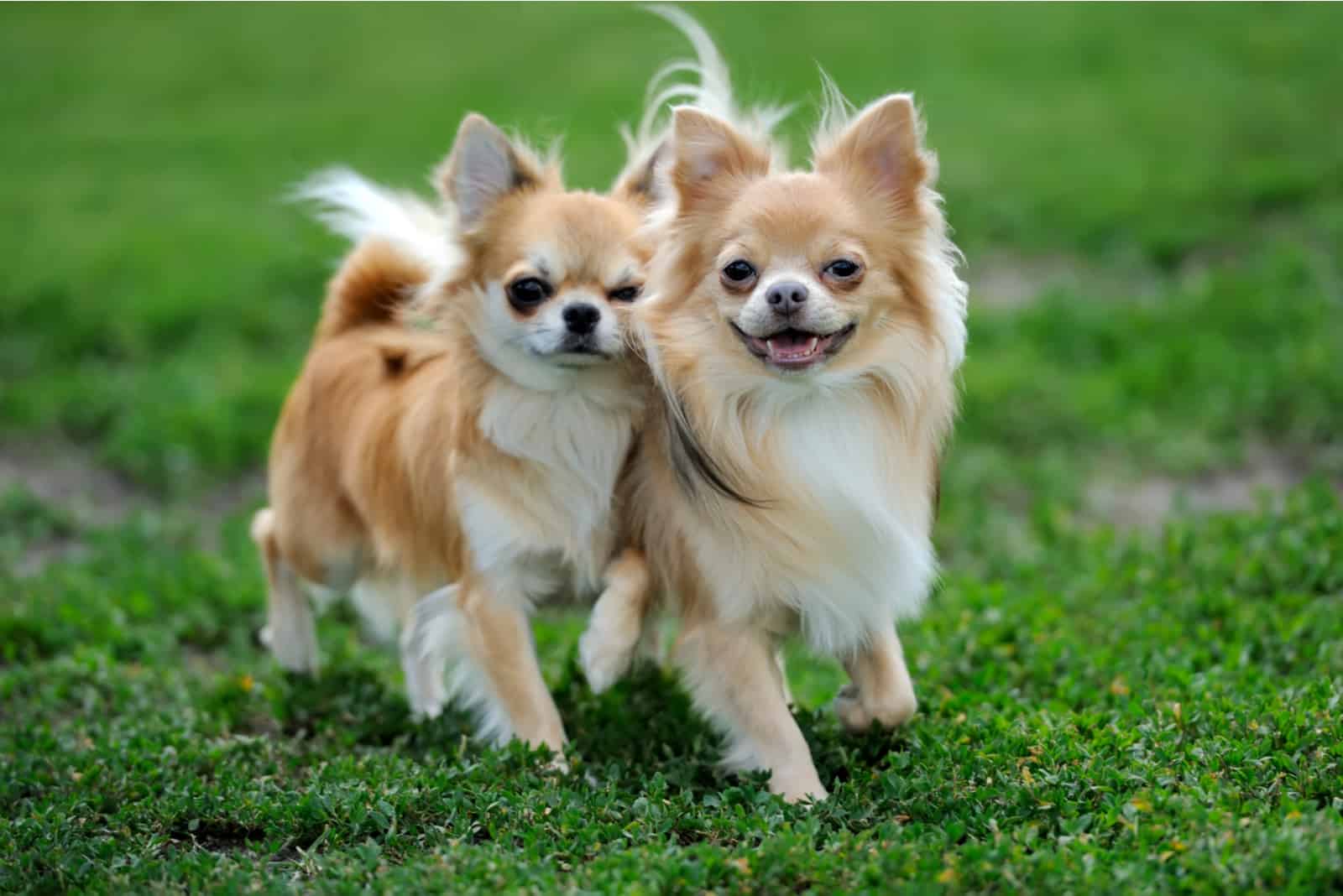Small, full of personality, looks great in a sweater … Yes, we are talking about Chihuahuas. These cute dogs may be known as the smallest dog breed, but they have huge personalities stuffed into their tiny bodies, and their charisma makes them very appealing to people. This popular family pet is loyal (sometimes fiercely so), playful, and famously adorable.
The short-haired Chihuahuas we know today were discovered in the 1850s in the Mexican state of Chihuahua, from which they took their name. The first American Kennel Club registration of a Chihuahua was recorded in 1908.
Chihuahuas love nothing more than being with their people and require a minimum of grooming and exercise. It’s not unusual for Chihuahuas to form a close bond with a single person, and they can become very demanding if they are overindulged.
If you are wrestling with the final decision of whether you should choose a male or a female Chihuahua, this article is perfect for you! This is not the easiest question to answer, and it will require more thought than just picking a gender out of a hat. Some marked differences in male vs. female Chihuahua can affect which one will be right for you and your home.
Let’s look over male vs. female Chihuahua differences.
What Is The Difference Between Male And Female Chihuahuas?

Both male and female Chihuahuas are excellent choices for a pet. As puppies, there won’t be much of a striking difference between them, but as they grow older, notable differences in male vs. female Chihuahua start to appear.
Even though they might seem like lap dogs (they like to cuddle), they also need regular exercise. This means daily walks and playtime. Chihuahuas are very adaptable and make good pets in even small city apartments.
Although there are a few distinct differences between the genders, neither of the two is outright better than the other. At the end of the day, it’s more about which sex is the best fit for your lifestyle, rather than which one is superior overall.
If you want a Chihuahua that’s loyal to everyone in the family, quick to train, and gentle around other pets, then you may want to get a male Chihuahua. But if you want a Chihuahua that’s more playful, cautious around strangers, and gentle around kids, then you may want to get a female Chihuahua.
Check out the table below to see the main male vs. female Chihuahua differences between these two genders:
[table id=54 /]
Male Vs. Female Chihuahua Size
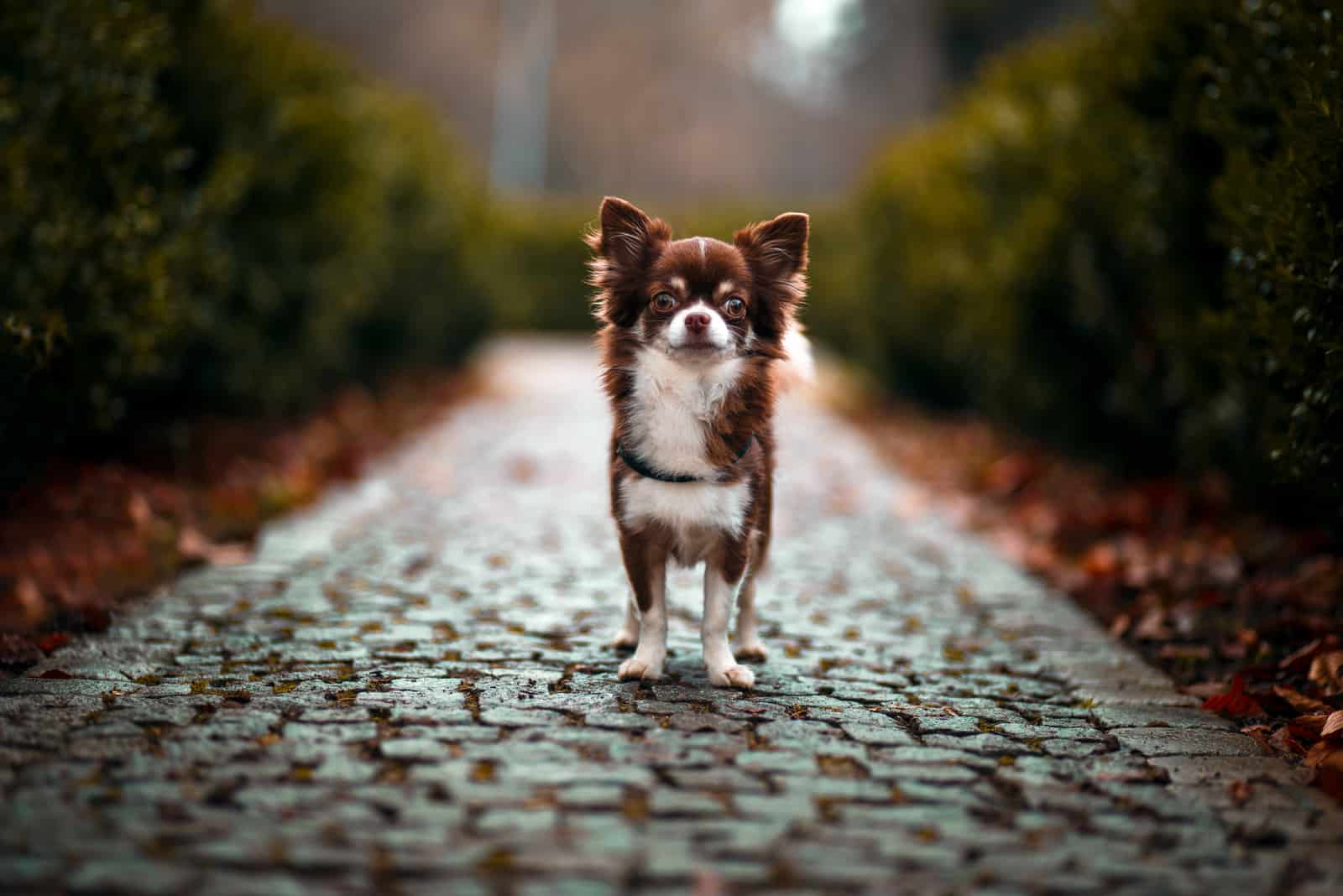
The Chihuahua is a balanced, graceful dog of terrier-like demeanor, weighing no more than 6 pounds. The rounded “apple” head is a breed hallmark. The erect ears and full, luminous eyes are acutely expressive. Coats come in many colors and patterns and can be long or short. The varieties are identical except for coats.
It’s important when considering the Chihuahuas to take into account their small size. Chihuahuas are curious and bold explorers. They can escape from yards through small gaps in the fence and can squeeze into places that other puppies and dogs wouldn’t be able to fit.
The male Chihuahua is slightly taller than their female counterpart and can grow up to 9 inches in height. However, their weight will never exceed 6 pounds because of their small body structure.
Female Chihuahuas are slightly shorter than their male counterparts. An adult female dog can grow up to 7 inches. However, they will never weigh more than 6 pounds, just like the male Chihuahua.
Chihuahua Temperament Male Vs. Female

Photo from: @chihuahua_channel_
A Chihuahua’s personality can range from feisty and outgoing to shy and timid. Often labeled as ‘a big dog in a small dog’s body,’ a Chihuahua’s protective tendencies mean that they may try to ward off larger dogs or people they don’t know.
Furthermore, their alert nature and suspicion of strangers make them excellent watchdogs. But their bark is quite literally worse than their bite, and they are generally fun-loving and enjoyable companions.
In terms of temperament, males and females are both playful and comical, but each dog has its own personality. Bear in mind that the most common issues regarding their behavior may be directly related to whether or not your Chihuahua is neutered or spayed.
While it’s true that all dogs have individual personality traits, there are definite trends in how they act. In the context of male vs. female Chihuahua temperament, here is what’s important.
The Male Chihuahua
Male Chihuahua puppies are typically more affectionate than female puppies. They are more loyal and protective of their owner and family members. So, if you’re looking for a dog that will lavish you with attention and constantly follow you around the house, maybe consider a male.
Male dogs tend to be calmer, more comfortable to get along with, and are more loving than females. They are also easily content. They can be left in one corner of the room and not be aggressive while you watch TV, read, or do household chores.
As they grow into adults, their temperament changes slightly. They may become slower to respond and start to challenge dominance over their owner, but they never become too aggressive.
However, there are few facts you need to know about male Chihuahuas:
• Dominance – male dogs are more likely to challenge your leadership, including ignoring commands, becoming more aggressive when you go near ‘their things’ like toys, bed, etc.
• Marking – it’s a fact of life when you own a dog. For the uninitiated, this means that sometimes they like to ‘mark’ their territory or spray a tiny bit of pee against things. This is far more common with an unneutered male Chihuahua.
• Humping – while it’s not just males that hump, and even though it’s not only a sexual thing, male Chihuahuas will hump things a lot more than females.
• Chasing Females – male Chihuahuas have unmanageable control over their hormones, meaning they may run a lot, have the urge to chase female Chihuahuas, and hump male or female dogs. Female dogs in their heat cycle can be picked up by other dogs from up to 3 miles away.
Neutering Male Chihuahuas
It is necessary to know that a male adult Chihuahua’s temperament largely depends on whether they are neutered or not.
Often people are mistaken into falling into a moral argument of whether neutering your Chihuahua is ethically right. The truth is that there is nothing cruel about neutering them. Of course, nobody can force you to neuter (or spay) your dog – that’s your decision.
Neutering prevents aggressiveness and territorial behaviors and also means that your dog won’t spend his entire walk hunting for a partner. With neutering, your vet removes not only the testicles but also any associated structures.
Unneutered male Chihuahuas also have a higher risk of developing illnesses that can affect their health.
The Female Chihuahua
Female Chihuahuas are generally calmer and less rowdy than their male counterparts, making them an excellent choice for families living in smaller homes or apartments. They are also more likely to relax and take it easy, especially around their owners. So, if you’re interested in a little lap dog that you can take everywhere with you, you’re going to want a female.
However, because of their innate maternal instinct to protect their young, females tend to bark more than males. They may also become bossy and assert their dominance over males.
Also, expect them to have bouts of mood swings when they are in heat. Their heat cycle usually occurs every six or nine months and can last for about a month. It’s just something to bear in mind.
Even the most gentle, well-behaved, and tolerant dog can become edgy and irritable when they go in heat.
Spaying Female Chihuahuas
Spaying is the surgical removal of the ovaries and uterus. This operation is a little complicated, but it is still considered routine, and in most cases, your pet is home the next day. Besides eliminating unplanned pregnancies, the operation eliminates the heat cycle.
Unspayed female Chihuahuas go through their adolescent phase with minimal changes to their behavior. They may also be a target for male dogs who can smell when females are in heat. Females have a higher tendency to run away to find a male mate when they are in heat.
Male Vs. Female Chihuahua: Training
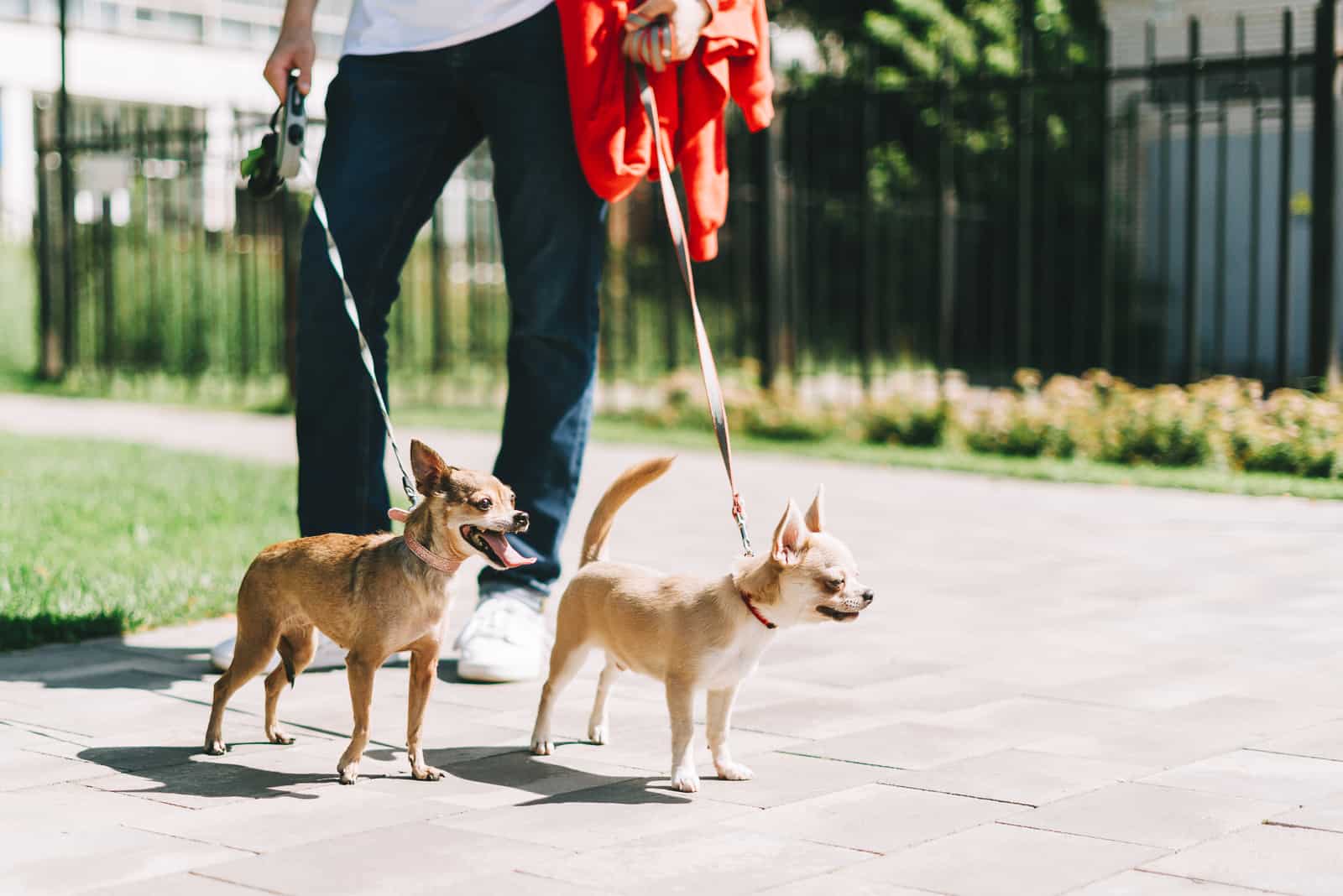
Chihuahuas are as easy to housetrain as any other breed as long as you take them out frequently and on a consistent schedule. Using a crate to confine them when you’re unable to supervise them will teach them that they can control their bladder and prevent them from having accidents in the house.
Even though they are small, Chihuahuas have plenty of energy and need at least 30 minutes of daily exercise. Training your Chihuahua can begin from around four months old and will help your pet grow into a well-rounded, social dog. They are enthusiastic learners and can match up with large dog breeds in terms of obedience and training.
Unfortunately, too many people with Chihuahuas allow them to become little tyrants, displaying manners that would not be acceptable in a larger dog. These dogs need gentle and consistent training from puppyhood to control their nipping as well as any tendency they have to fight with other dogs.
Like many small dogs, Chihuahuas aren’t aware of their own size and can sometimes act as guard dogs. They won’t hesitate to challenge a dog many times larger than themselves.
Train your Chihuahuas using positive reinforcement techniques such as food rewards, praise, and play, and you will soon find that they can learn anything you can teach. In the context of male vs. female Chihuahua training, check out this information.
Male Chihuahuas are generally fast learners. They respond well to commands and are quick to learn. Once a command is learned, they are most likely to obey it every time.
Males generally have a lower tolerance for sitting still for long periods. They often challenge authority by growling, nipping, barking, or ignoring commands when they get bored. This may be addressed with proper and consistent training.
Female Chihuahuas are generally quick learners, but they are often more difficult to train to obey. They take time to respond to commands and require more patience in teaching them.
Training them requires consistency. Once a command is learned, it is more likely that they may not always obey. Females generally need more positive reinforcement than their male counterparts.
Male Vs. Female Chihuahua – Socialization
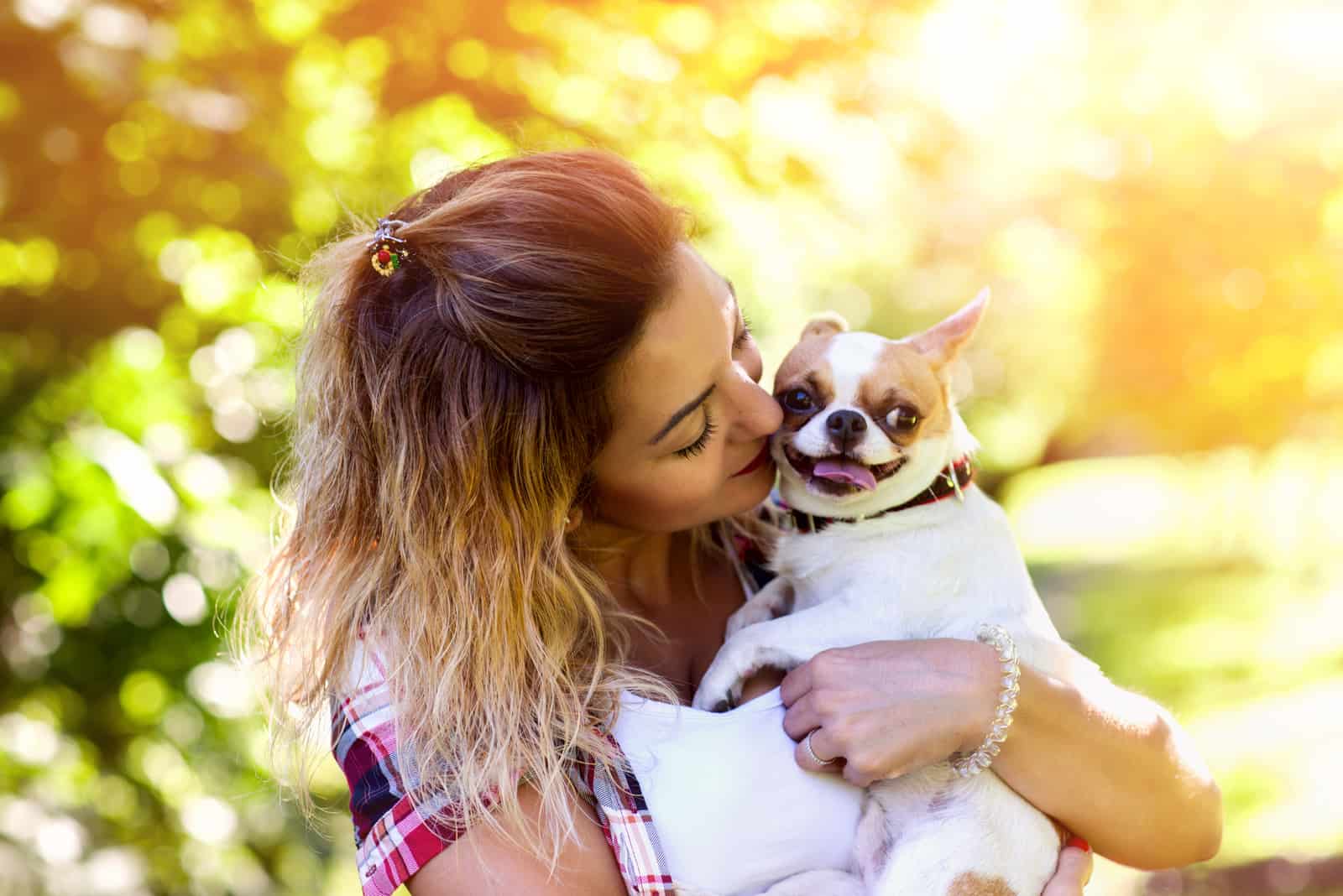
Like every dog, Chihuahuas need early socialization. If your dog isn’t social, you might have issues taking it to other people’s homes or introducing it to new pets.
It is suggested that Chihuahuas live with families with quiet, older children who already know how to interact with them appropriately. Children over ten years old are considered to be mature enough to handle the vulnerabilities of Chihuahuas.
Always teach children how to approach and touch dogs, and always supervise any interactions between dogs and young children to prevent any aggressive behavior from both sides. Remind them not to touch the dog while sleeping or eating.
Male Chihuahuas are more playful than females. They get along well with female dogs. Males are less suspicious of strangers and are easier to socialize with other people. A male Chi is more likely to bond with all family members.
Female Chihuahuas are known to be protective and more serious. They are less playful but gentler than their male counterparts. Females are more suspicious of strangers and a bit harder to socialize with people. They are more cautious around kids and usually get along well with male dogs.
In general, the Chihuahua breed does get along nicely with other dogs under the same roof and can even become best friends with large breeds. However, make sure that the larger dogs are calm, good-natured, and well-socialized.
Are Chihuahuas Good With Children?

Chihuahuas, quirky and comical, are generally good-natured with children. But, because of their feisty, no-holds-barred kind of attitude, these pocket-sized canines have a reputation for being snappy and sometimes even aggressive.
In a house of full-grown adults, you probably won’t feel too threatened by a rambunctious Chihuahua. If there are small children in your house, though, you’ll need to carefully survey the situation to determine if it’s safe.
Obedience is something that every Chihuahua needs to be taught, especially when small children are living in the same house. Ideally, this should be done at an early age when they are still a puppy.
Most Chihuahuas may easily become overwhelmed with loud conversations, yelling, running, and other quick movements that younger children often make. They also easily hurt themselves as they are at greater risk of being run over by bigger animals or children.
In the context of male vs. female Chihuahua behavior towards children and vice versa, children’s behavior towards dogs, here is what you need to know.
Male Chihuahuas are more playful than females. This playfulness may sometimes become too much and may harm them if they get strained. It is crucial to train them properly so that they will know their boundaries, like when to stop playing or which part of the house they can play in.
Female Chihuahuas are less playful but gentler than their male counterparts. They may play with children for about twenty minutes before slipping away. Females prefer being at their owner’s side most of the time.
With this, children must be taught when they should not play with their Chihuahua. Pushing them to play may result in aggression towards the children. You should also show your child how to safely pet and act around the family Chihuahua.
Many owners seem to forget or overlook the potential injuries that a child may cause a Chihuahua. Their ultra-small bones are delicate and easily break if not handled in the right way. Therefore, it’s important to sit down with your children and show them the right way to pet your Chihuahua.
Male Vs. Female: Which Is Better With Other Dogs?
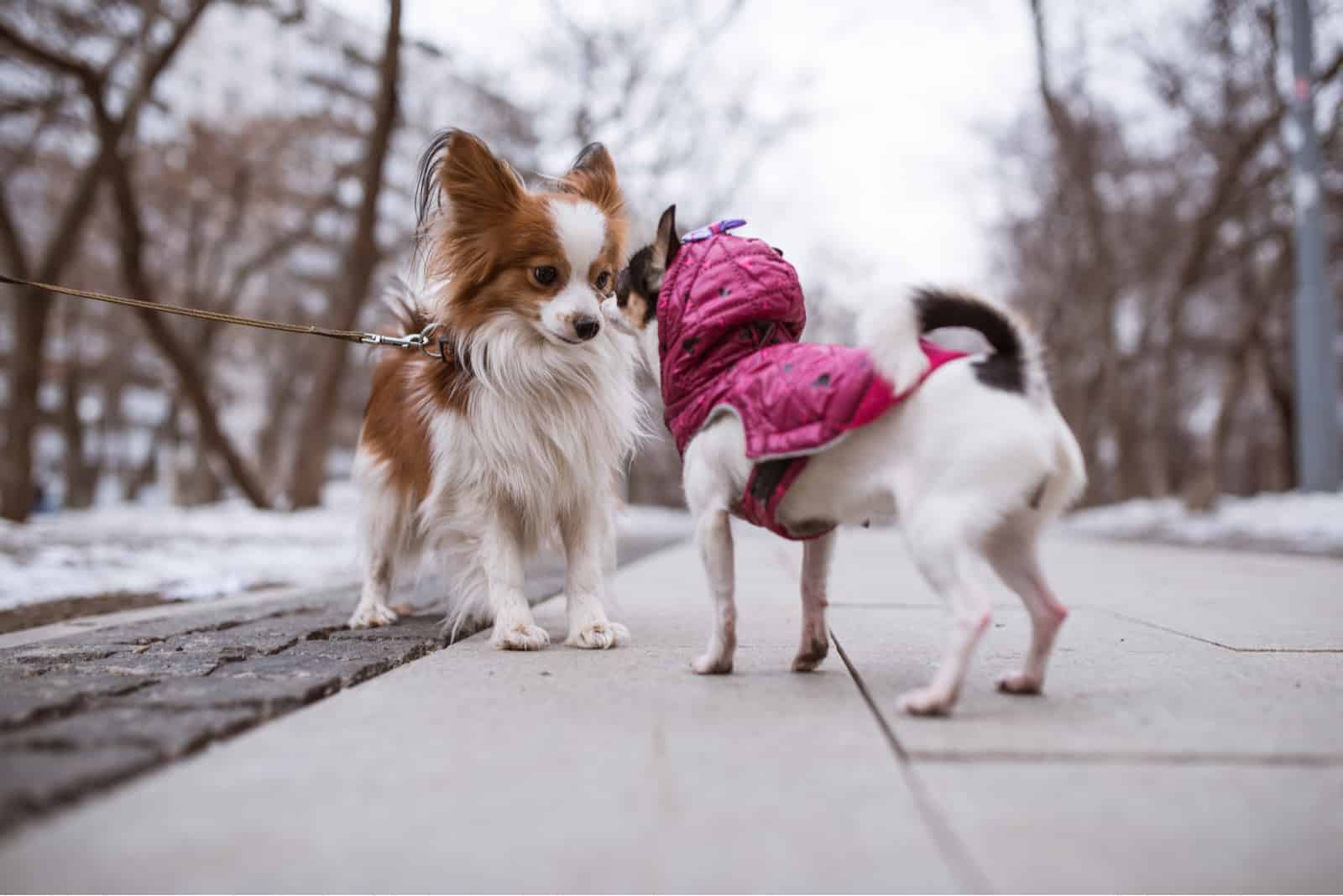
Male and female Chihuahuas generally adapt well to living with other dogs, given that they are appropriately acclimated or that they grow up together in a house.
However, extra precautions are needed when you try to mix them with larger dogs. As mentioned earlier, ensure the larger dogs are calm, good-natured, and well-socialized.
Male Chihuahuas generally get along well with other dogs. Although they may be aggressive at first, they quickly become at ease with other dogs if properly introduced.
The female Chihuahua’s protective and strong-willed nature makes them fiercer with other dogs, especially females.
Things can be a bit complex if you are wondering which gender to choose if you already have one dog and wish to add to the family. There are arguments to be made for both choices of either the same gender vs. the opposite gender.
Two males may fight for dominance. However, a male and a female may do this as well. Furthermore, two females may or may not get along. In most cases, the older, established dog will be the ‘leader’ among the canines.
Some owners find it easier to stay with the same gender simply because they have experience. For example, owners who have a female Chihuahua may be used to what comes along with the heat cycle or how to care for a female during the recovery period of being spayed. Owners of male Chihuahuas may be familiar with how a male will behave if he is intact and what to expect after neutering.
Male Vs. Female Chihuahua: Which Is Better With Cats?

If you have cats or other pets at home, you might want to consider thinking things over before getting a Chihuahua. Early socialization is crucial for these dogs. Being properly socialized with other pets early on in life dramatically reduces the development of anxiety and aggressiveness.
In general, the Chihuahua is known for being very well-behaved around cats. In some households, a Chi and a cat can become best friends, seeing one another as peers. Depending on their respective ages, one can become very protective of the other. The household will be harmonious, playful at times, and relatively peaceful.
If you wish to see if your Chihuahua can get along with a cat or vice versa, the best thing to do is test their interaction. While it most likely will be that the dog does not tolerate the cat, care must be taken in the case of a Chihuahua. Since many cats are quite a bit larger than this breed, even if a dog begins a fight, the cat may end it.
The male Chihuahua’s fun-loving character makes him an ideal friend to other pets in the house. Males may find it easier to adapt and live with other pets in the home, as they are less suspicious than females.
The female Chihuahua’s high-mindedness and tenacity to her owner make her very alert and highly cautious of other pets. They also tend to be more assertive of their position in the house and show their dominance by barking and making their territories known. Female Chihuahuas may take a significant amount of time to become accustomed to other pets and may show a dominating attitude towards them.
Male Vs. Female Chihuahua – Health

The majority of Chihuahuas are healthy little dogs, but both male and female Chihuahuas are equally at risk for basic doggie health concerns.
Chihuahuas are mainly prone to developing hydrocephalus and eye injuries later in life. They also love a warm climate and may have a hard time surviving in cold weather.
What you feed your dog is important too. Vets recommend feeding fully-grown Chihuahuas a high-quality dog food twice daily, using the information on the food packaging to determine portion sizes, making sure to consider their age, size, and daily activity.
To help you be more aware and prepared for potential ailments if they should arise, we have put together some information on the health issues that can affect Chihuahuas.
Let’s look over male vs. female Chihuahua health issues.
Males
Male Chihuahuas are at risk for developing:
• Cryptorchidism – the medical term for an undescended testicle in dogs. If one or both testicles are not removed from inside the body, it can lead to cancer and an increased chance of having behavioral problems like aggression, mainly due to high testosterone levels.
• Prostate cancer – is also the leading cancer type in almost all dog breeds. It can quickly spread to other body parts.
Females
Female Chihuahuas are at risk for developing:
• Mammary cancer – for non-spayed females, this form of cancer is the most common, and almost a quarter of female chihuahuas develop this deadly disease.
• Cysts and tumors – cysts and tumors on the ovaries can occur and cause your dog considerable pain.
They are also at risk of their uterus being infected with pyometra, which could lead to their death if not addressed immediately. Therefore, spaying is a sensible option to minimize these risks.
Other Chihuahua Health Issues
The following conditions may affect Chihuahuas:
• Patellar luxation
• Hypoglycemia
• Heart murmurs
• Pulmonic stenosis
• Hydrocephalus
• Open fontanel
• Shivering
Not all Chihuahuas will get any or all of these diseases, but it’s important to be aware of them so you can be informed when you interview breeders and can know what to look for throughout your Chihuahua’s life.
Should I Get A Male Or A Female Chihuahua?

If you are thinking of bringing a Chihuahua into your home and are still wondering if a male or female would best suit you, bear in mind that a dog’s behavior is influenced significantly by genetics and the kind of environment he/she is raised in.
Regardless of gender, every dog needs to be properly socialized with people, other dogs, cats, and others in their environment to minimize aggressive behavior.
If you already have a dog, you will want to get a Chihuahua of the opposite gender. Two dogs of the same gender tend not to get along.
Are you looking for a dog that is loyal, affectionate, easy to train, not moody, and, most importantly, who will obey learned commands? A male Chihuahua is the right gender for you.
If you want a dog who doesn’t demand much attention, is protective, independent, and doesn’t test dominance over his/her owner, then we have a winner: a female Chihuahua is perfect for you.
All Chihuahuas are beautiful family dogs and can easily become a part of your family. The male vs. female question is a very personal one. You should think about the type of pet you wish to own and which gender you want to have as your best friend.
Read Next: What Were Chihuahuas Bred For? Origins of These Little Dogs

